A beloved rural Iowa diner closes. A family of Mexican immigrants reopens it — with a twist.
DENISON — If heritage and legacy were as solid as bricks and siding, Cronk’s Café in Denison would be built of both.
Nestled in the crook of two state routes, the sort that tracked outsiders off the beaten path before interstates carved the country, the black and yellow sign above Cronk's has been a staple in these parts since 1929 — as long as most people in town can remember, really.
Behind the front counter — where a sleek new iPad is all that betrays the walnut-wooded old-time aesthetic — hang yellowed newspaper clippings, signed photographs from country western acts that long ago toured the small-town circuit and vintage plaques from local teams that went to state tournaments — the equivalent of winning the Lombardi or the Larry O’Brien in this particular slice of Midwestern Americana.
A community hub as much as a diner, Cronk’s served sides of hospitality as much as buttered toast. It was a place where waitresses had regulars, and regulars had usuals. The sort of ma and pa joint where if a favorite ain’t on the menu, just ask; the kitchen’ll probably whip it up special.
The attached lounge and party room played host to generations of wedding receptions and funeral luncheons and baby showers and graduation parties. And the Round Table, carefully placed in the dining room’s sunny corner, was for good ol' boys talking politics or church ladies chatting anything but.
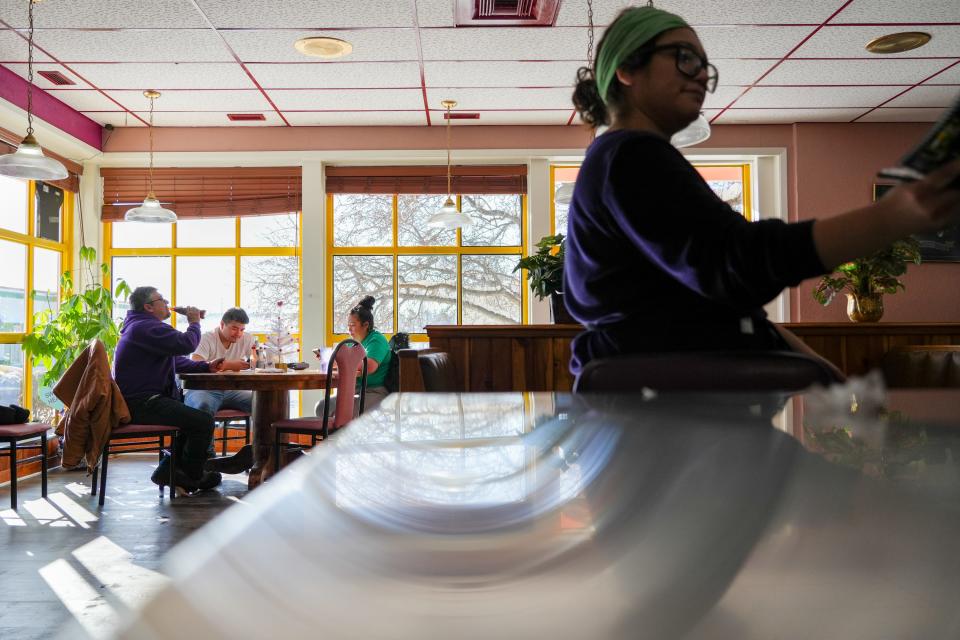
Politics became as much a staple here as the $1 bottomless coffee, the perfect backdrop for Iowa Caucus candidates seeking their fortunes from McGovern through Biden. The current president’s picture hangs next to a menu from 1948 — when hot dogs were a quarter — and a Register column about a flat-topped National Guardsman’s 90,000th cup of joe. (He came in every day at 6:30 a.m. and 3:45 p.m. for a dozen or so mugs of the good stuff, and his love for java was eclipsed only, he said, by that for his family and for vanilla ice cream topped with peanut butter.)
Speaking of the menu, Cronk’s was classic farm culture: hearty breakfasts all day and loose meat sandwiches and blue-plate meatloaf specials and pie — oh, the pie. The rotating list was a veritable greatest hits of Grandma’s favorites: cherry, peach, lemon meringue, coconut cream, French silk and, of course, apple.
So, you see, it’s memories that peppered the walls right alongside posters at Cronk’s, and history that hung in the air as thick as the bacon aroma wafting in every time the kitchen doors flapped during a morning rush.
And when Cronk’s Café closed in 2020 — a victim of aging ownership and the pandemic shutdown, a one-two punch that took many rural restaurants — the grief in these parts felt just as tangible. A heartache for the loss not just of Denison’s nicest restaurant, but for the place residents gathered in good times and in bad.
Now, more than three years and one shiny new kitchen later, the doors of Cronk’s are reopened. But with a few twists.
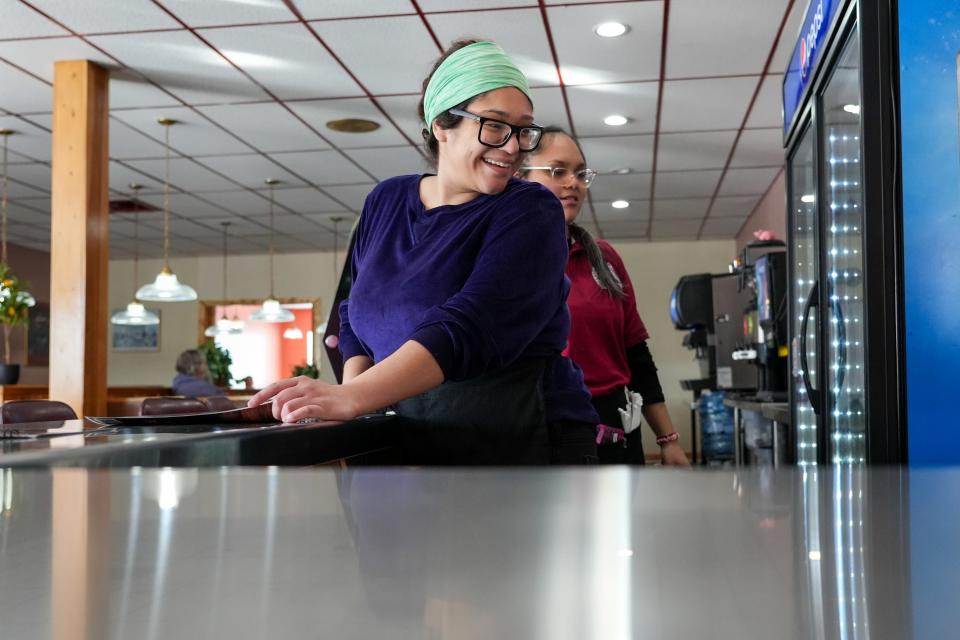
This red, white and blue stalwart was saved by Ramon Patino, a Mexican immigrant and well-respected restaurateur with two other storefronts. He and his son, Omar, co-owner and operations manager, represent a new guard in Denison, a community that after decades of steady immigration to the hard labor and good pay at two local meatpacking plants has bucked the relentless population loss of much of rural America — heck, the bulk of west central Iowa — and become a majority-minority hamlet in the process.
The Patinos have kept the bones of old Denison in this renewed Cronk’s, chiefly in its look and feel. The newspaper clippings, the knickknacks, the pie menu. And, most importantly, the name.
But they’ve made some changes: The bread and butter that used to come gratis to tables is now chips and salsa. The coffee mugs and the salt and pepper shakers are the same, but the walls are bright pinks and salmons instead of muted tan. And the menu declares, in all caps, that inside is AMERICAN & MEXICAN CUISINE — a culinary celebration of how blending those whose faces are fresh with those whose roots run deep has allowed Denison to flourish.
If this blended model succeeds, experts say Cronk’s could be a prototype for the way forward as America’s countryside empties out and rural diners fire on their last tickets.
Indeed, in its first weeks open, this nouveau hometown diner in the reaches of Iowa seems to show promise in stitching together old and new — one plate at a time.
But given the rancor of our divided times, can all this camaraderie really last?
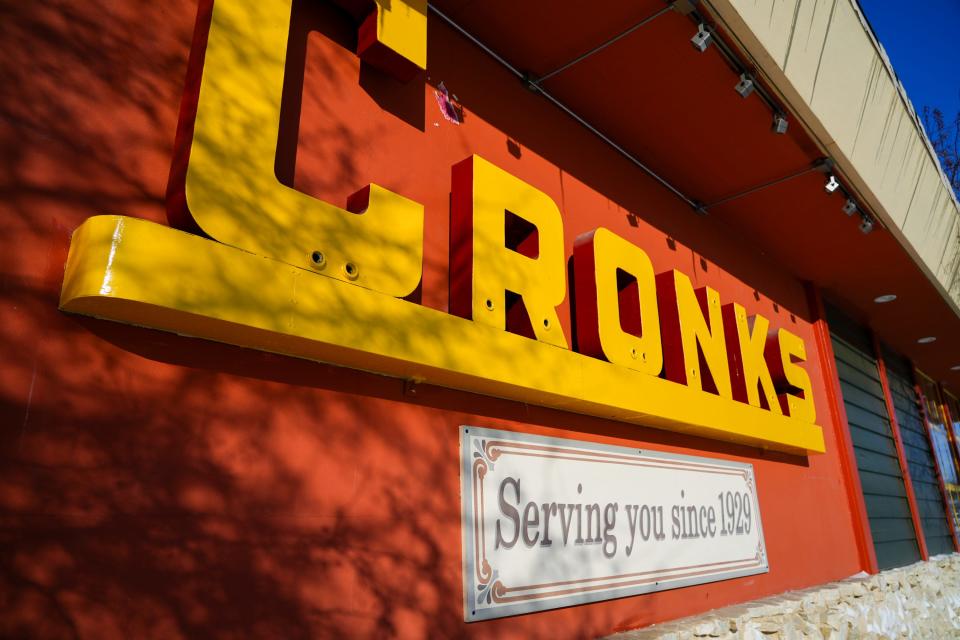
A grill master achieves his dream — twice. Will a new opportunity lead to the same success?
The biggest crush at Cronk’s ends around 2 p.m. most days.
By then, the bleed between the coffee-and-egg crowd — mostly older guys sitting at the diner’s bar or friends starting the day with greetings and gossip — and the soup-and-salad business lunch throng finally gives way to quiet.
The hush is a welcome respite for Omar Patino, who has been at the restaurant since before sunrise. In the afternoon stillness, the-24-year-old can finally sit — maybe even sneak an hourlong nap before dinner service.
Well, sometimes.
The din of clanking plates has dulled, but his cellphone hasn’t stopped buzzing with issues and questions about the restaurant and the two combination taqueria-grocery stores he owns with his dad. And the chefs at Cronk’s have used their lull to do a little inventory. They need to add to this week’s order, and preferably before the weekend deadline: roast beef, milk, chorizo.
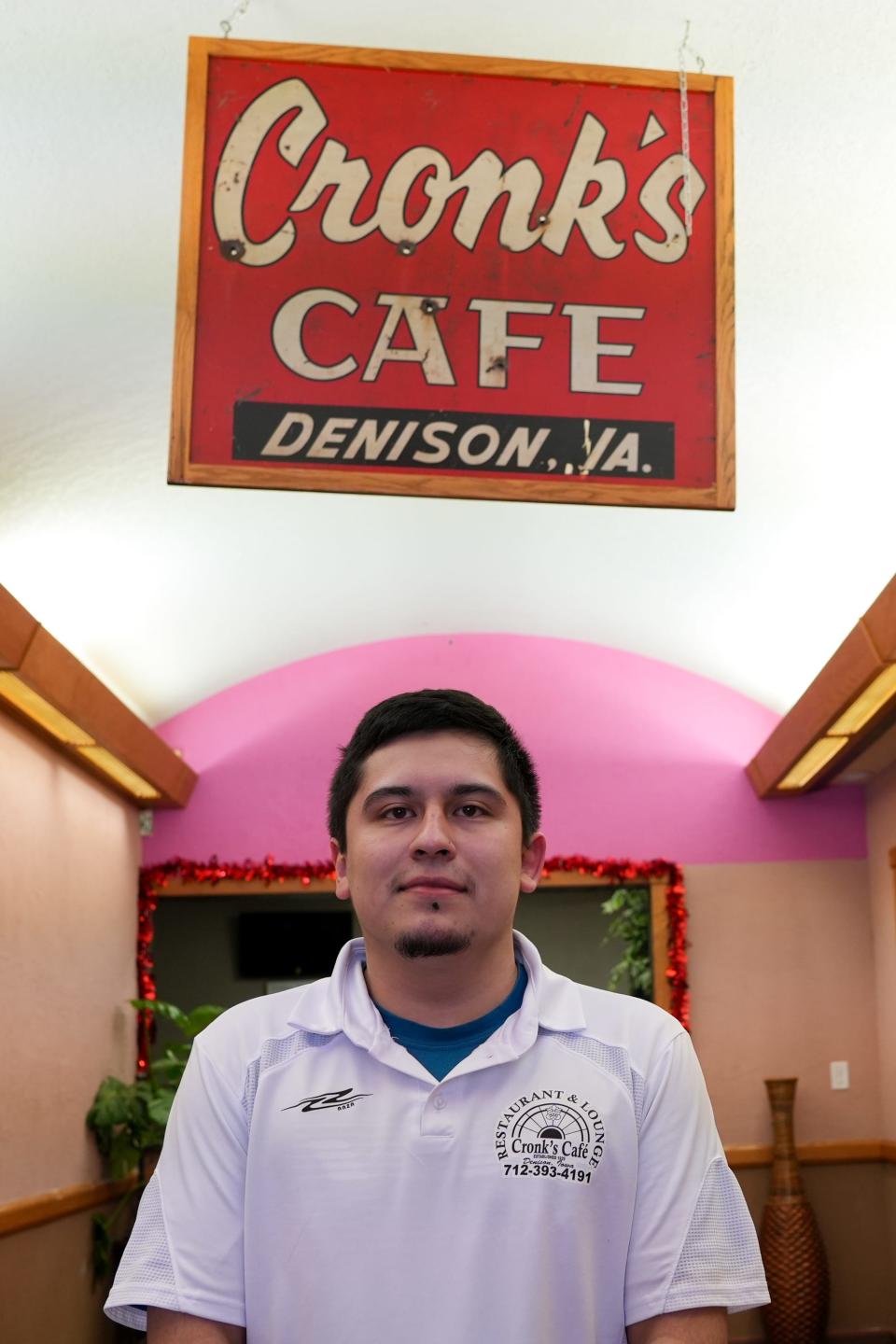
“When we first opened up, we didn't know really how much to order of each thing,” Patino says, especially for the American menu items. “So there were times we ran out of hamburger buns or ketchup and had to go to Walmart to get more supplies.”
Anyone in the food business knows openings are all-consuming, so, yeah, Patino is “a little tired,” he confesses, his drooping eyelids betraying the “little” categorization. But he grew up in the back of a restaurant, at the right hand of his father, so he’s well aware of the breakneck pace he’ll be sprinting at for a while.
His father, Ramon, has been king of the grill for as long as Patino can remember. Over the coals, his dad’s passion for cooking and for people came alive. He’d volunteer to host family parties and quinceañeras and Thanksgiving, making way more food than they could ever actually eat. Carne asada was his specialty, chicharrón, too, but he also always seared the perfect char on a hot dog.
And Patino, the oldest of three siblings, was often called on to be his assistant, gathering supplies while Ramon ruled his kingdom.
Ramon moved to Denison in 1994 and dreamed of a life off the line at the packing plant, his first job. He wanted to cook, and eventually open his own restaurant. So he saved as much as he could and in a few years, he’d built a nest egg large enough to launch a small grocery store, Tienda el Mexicano, the first Latino store in Denison, complete with a counter for tacos and snack service.
Ramon wanted his spot to feel like more than a store, more than a place you just pass through. He created a hub for the community to gather and enjoy each other’s company — like a full-time fiesta, but without the backyard. And he never stopped adding new touches: more decorations, more music.
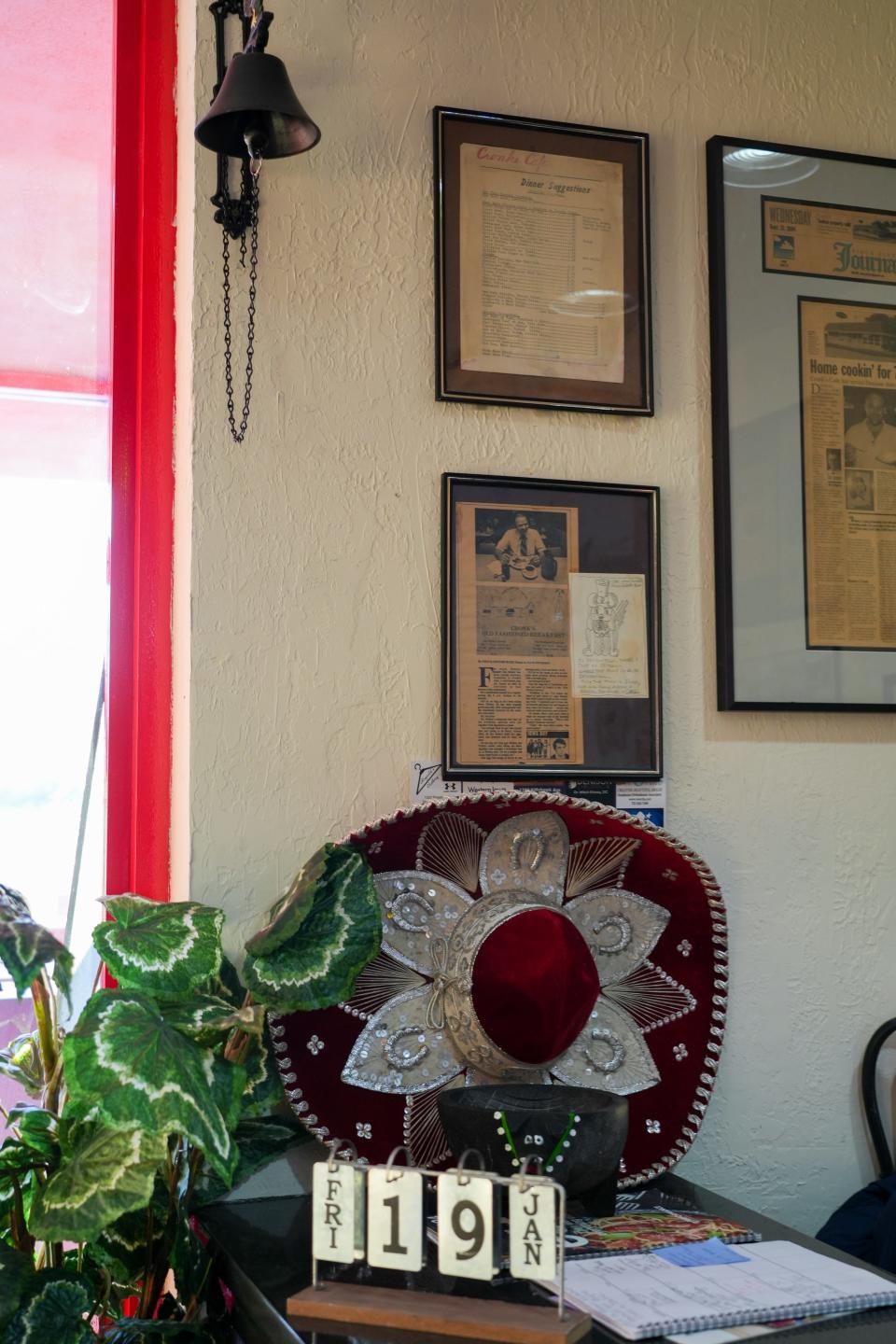
For a while, Ramon kept his full-time job, working every other waking hour at the store.
And if he wasn’t there, he leaned on the large Patino family in the area to help. All his aunts, uncles, siblings, heck, even in-laws and second cousins, they became cashiers, chefs, whatever was needed — including serving as Omar Patino’s babysitter.
“They would take turns taking care of us and we wouldn't mind,” he says. “We would just be there watching them work.”
“We were there all the time,” he adds with emphasis.
One eye on the grill, one eye on the kid.
The store outgrew its first location. Ramon quit his packing job. He opened another store in Storm Lake, Tienda el Mexicano No. 2.
“Ramon is very known in town. People respect him a lot,” says Lorena Lopez, owner of Denison’s bilingual newspaper and unofficial spokesperson for the local Latino population.
“He collaborates a lot with the community, like when someone dies or somebody gets sick, he donates.”
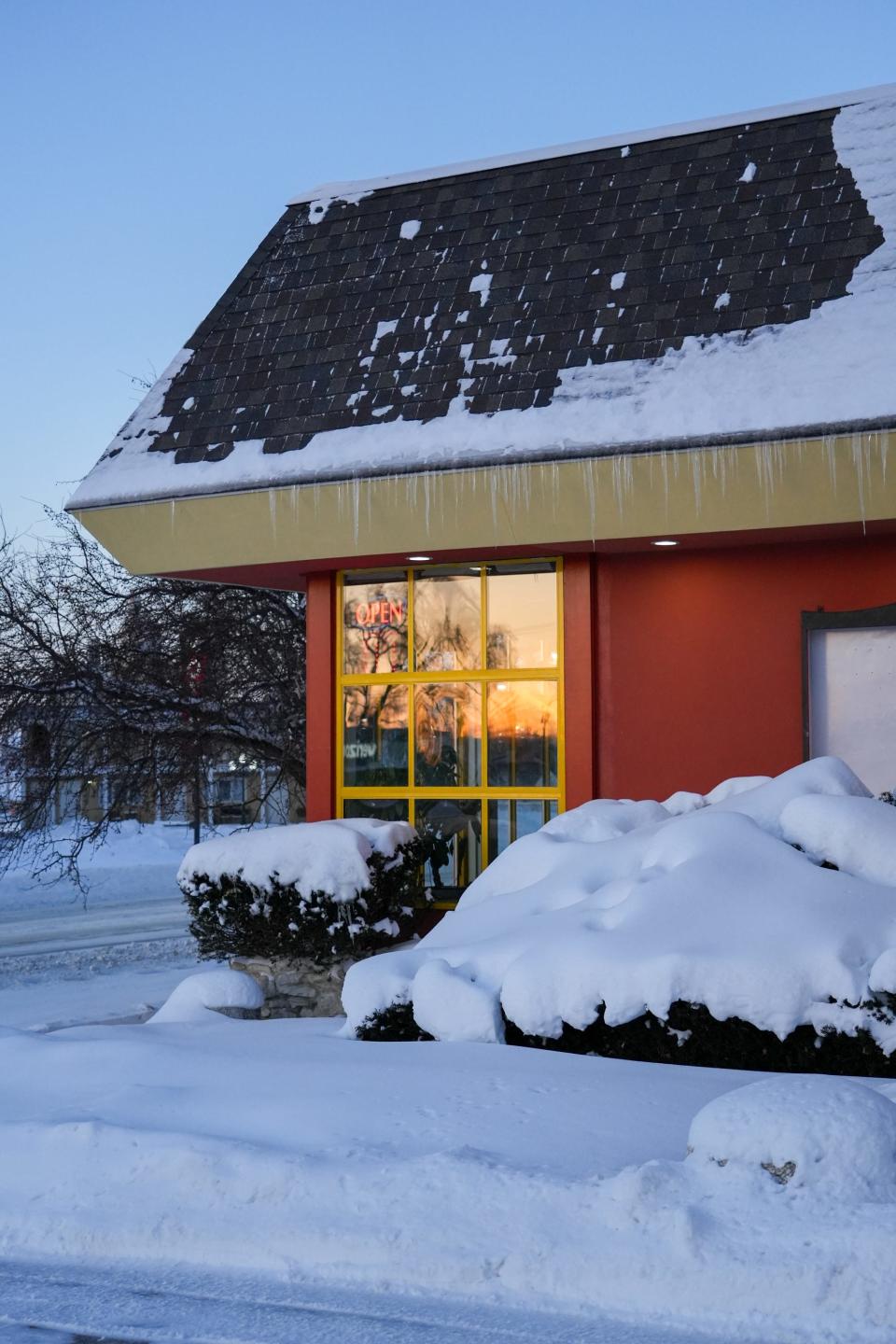
Not even a mile by car from Ramon’s store was Cronk’s, its black and yellow sign guarding an always full parking lot, Lopez says. The Latino community knew of Cronk’s, of course, but Latinos weren’t necessarily patrons, she says, having heard the establishment catered mostly to American tastes.
But Ramon’s love of food and the restaurant business meant he followed a crowd, just to see what he could learn. So after church, he’d bring his family to the Sunday buffet, the restaurant’s busiest service.
“That was the big thing, and, I mean, it filled up in here,” Patino says.
Like everyone in Denison, the Patinos were sad to see Cronk’s close. But they had their hands full at the two stores, and weren’t considering adding a new locale to their portfolio until a real estate agent approached Ramon last year.
Ramon was a successful restaurateur and Cronk’s had been a successful restaurant, the agent said. Seems like they should be able to merge two successes for the betterment of all?
The Patinos toured the space. Cronk’s would need a remodel — really the kitchen would have to be overhauled with new grills, fryers, dishwashers and refrigerators — but it was well-maintained. Strong bones.
And for the father-son duo, picturing the place in operation wasn’t hard. The previous owners had left it ready for service: silverware and napkins laid out on tables, sugar canisters filled and ready for coffee, like they’d locked up one day expecting a breakfast rush the next and just never came back.
All that was needed were diners.
‘Just too hard to go on’: Rural restaurants are community hubs — but margins are ‘razor thin’
Eric Skoog had 80 pounds of corn beef ready to go for that night’s St. Patrick’s Day celebrations when word arrived from Des Moines. This was March 2020 and the nascent coronavirus pandemic had finally reached the middle of the country. In-person dining, the governor said, would join a long list of temporarily banned activities.
Whether he wanted or not: Cronk’s was closed.
Skoog had owned Cronk’s ― which was named for the diner's original owner, L.J. Cronk ― since 1984. He’d signed on to help his dad out for a few months when the patriarch bought the business back in 1977. But as he likes to say, a few months became nearly 40 years before he and his wife, Terri, knew it.
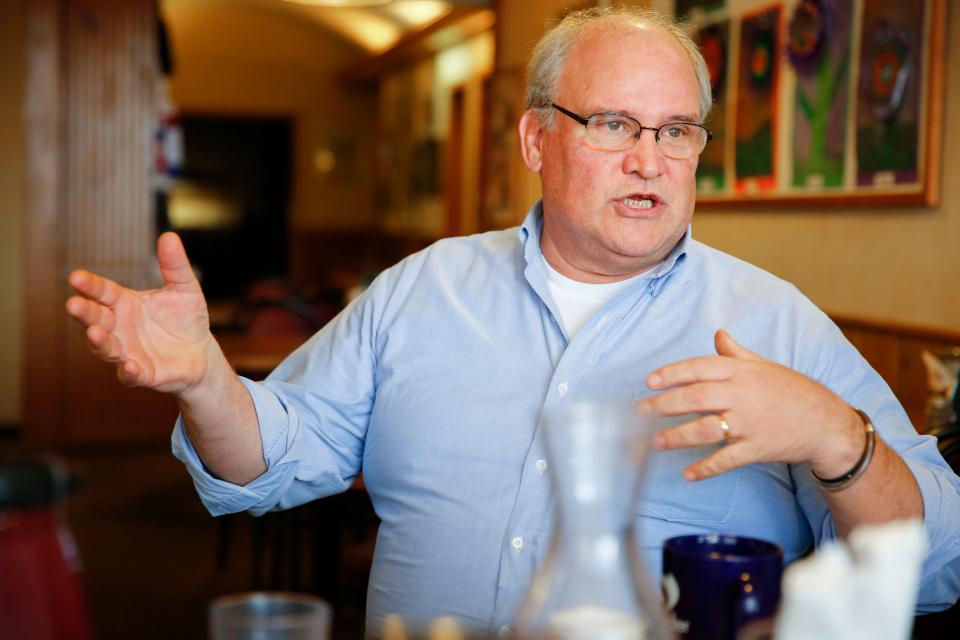
And Skoog loved every second. He was predisposed to, he says.
Like Patino, Skoog grew up in a restaurant family. His dad, John, ran a pancake house in Joliet, Illinois, that became a favorite of McDonald’s founder Ray Kroc, who eventually convinced the elder Skoog to open the first franchises in Omaha.
Over the years, Skoog built Cronk’s into a must-stop on the Iowa Caucus trail. Dozens and dozens of candidates used his back room for rallies and speeches. And Denison’s most famous daughter, actress Donna Reed, best known for playing Mary in the Christmas classic “It’s a Wonderful Life,” stopped by when she was in town.
But more than that, he cultivated a neighborly experience. He, his wife and his three kids were often in front to greet customers. And if they weren’t there, they were busing plates and refilling coffee. Many times he didn’t charge the older guys who ordered only a cuppa. Get us next time, he’d say.
Or, if he couldn’t be found anywhere else, check the sunny corner. Skoog pulled up a chair and joined conversations at the Round Table in quiet moments.
If community members ever needed help, Skoog was there with food or a spot to hold meetings and events. He chipped in for the Latino population, too, Lopez says, whether that be aid in a time of tragedy or celebration, like all the years he drove his black and yellow 1929 Ford Model A roadster in the Cinco de Mayo parade.
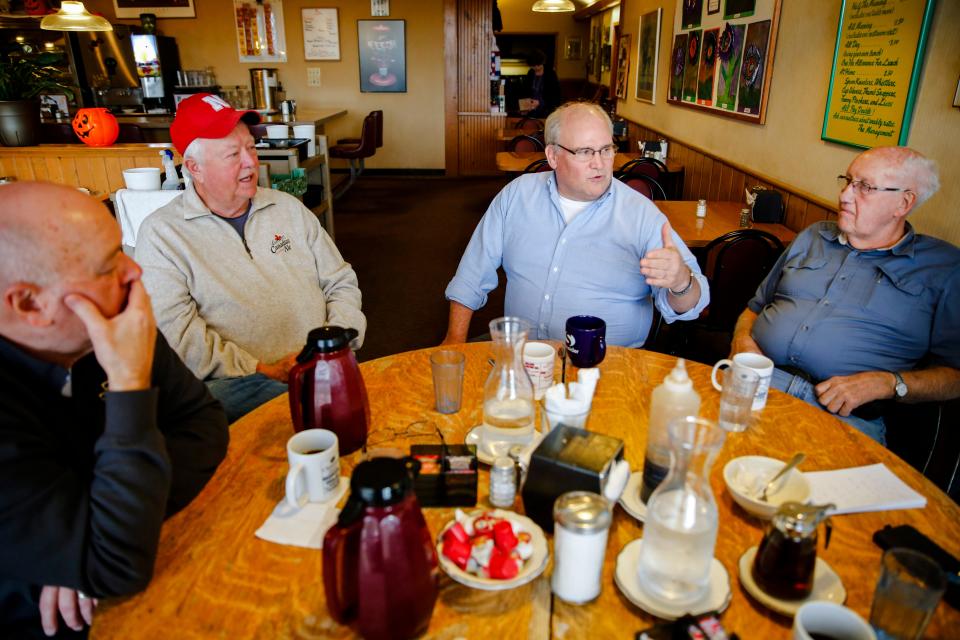
Cronk’s, like many rural restaurants, was the type of place as well-known for its characters as its comfort food, for its social connections as its specials, says Jessica Dunker, CEO of the Iowa Restaurant Association.
The magic was being there.
And, now, being there was impossible.
“There was a whole set of challenges related to COVID that prevented rural owners from being able to deliver what they wanted to, what they believed was important in order to meet the expectation of customers,” Dunker says. “You just didn’t want to let them down, and it's exhausting.”
Cronk’s, and the Skoogs, represent "a portion of the population in our industry that it was just too hard to go on,” she adds.
In the good days, restaurants are a 5%-8% net profit industry, “razor thin margins,” Dunker says. And even before COVID hit, many rural restaurants weren’t in sustainable financial positions long-term.
“What was essentially happening with some of these family-owned restaurants is that they created a lifestyle for themselves where that business was what they did, and that's what all of them did,” she says. “But if they went to sell it, there wouldn't be a profit and loss statement that would be compelling enough for somebody to come in and buy.”
Skoog did some quick back of the napkin calculations, parsing out how he was going to have to finance the restaurant to make it through. And as much as he loved the people and the place, well, retirement looked better.
He placed ads in the local newspaper to sell what product he had — he’d been stocking up on prime rib for a Cattlemen’s Association meeting that was scheduled a few days later — and then he locked the doors. Leaving silverware set and napkins folded.
The closing of Cronk’s hit the community hard, a wound that only festered as COVID restrictions eased and other places reopened their doors.
“People were sad to see it close,” Lopez says. “It is a historic place in this community and for everybody here in Denison.”
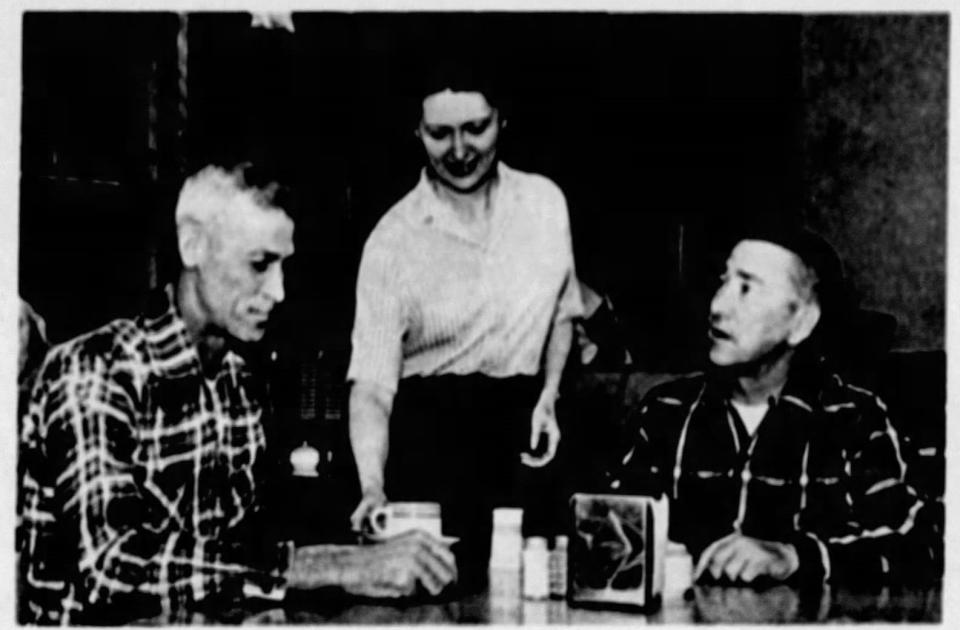
Speculation ran wild around town. There was a rumor that an Omaha brand was going to purchase the building and put in a fancy new steakhouse. Then another that it would become a chain.
Then people heard the buyer was local. Then that it was Ramon and his son.
“When people found out that he bought the place, everybody was asking, ‘Are you going to keep the same name? Are you going to keep Cronk’s?’” Lopez says. “’Are you going to be a Mexican store?’”
Yes, they were going to keep the name, the Patinos reassured.
“I don't think we would have bought this place if it was just any other restaurant. The Cronk’s name was a big part of why we bought it,” Omar Patino says.
But, no, they weren’t going to turn it into a Mexican store.
They were going to do something different. Something the community hadn’t seen yet.
Enchiladas and chicken-fried steak: How a restaurateur is creating a new playbook for harmony
Customers missed the old Cronk’s soup selection.
When the remodeled Cronk’s opened just after Thanksgiving, Omar Patino couldn’t go a service without hearing: What’s the soup of the day?
Of the day? They had broths for dipping quesabirrias, but a different soup? Every single day? Nope.
In the months since, the Patinos have not only added soups, but other classic diner favorites: Reuben, Philly cheesesteak, hot beef, barbecue pulled pork. Signs on each table advertise a new suite of chicken sandwiches: grilled, fried or “Malibu” style topped with Swiss and ham, served a la carte or as a platter with fries.
A recent daily special, which they’ve taken to writing on a sandwich board out front, was Iowa on a plate: chicken-fried steak with fries and sweet corn. Add a cup of that day’s soup — classic chunky chicken noodle — for just $3.
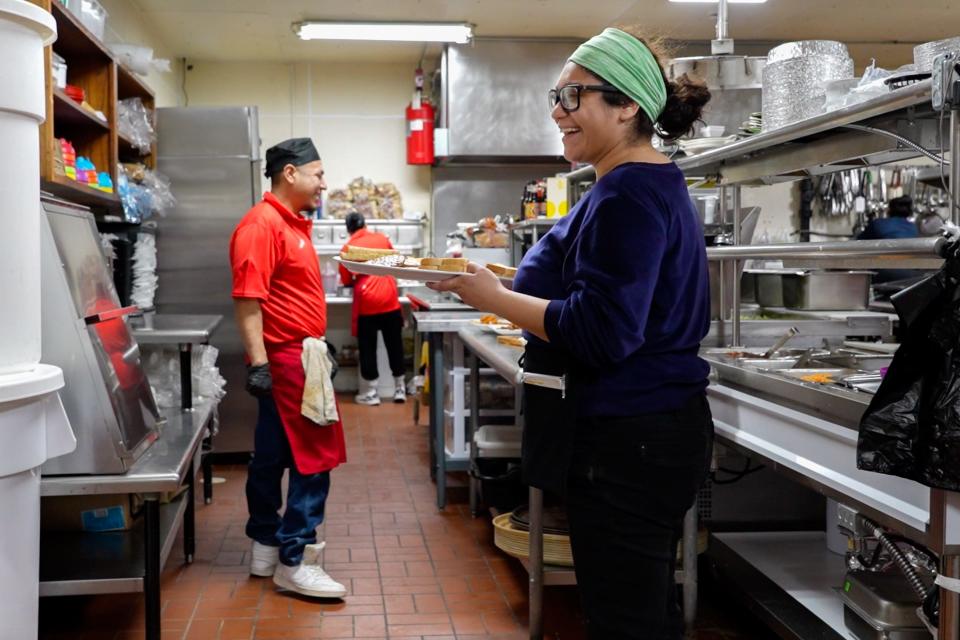
They hired a chef who used to work at the local truck stop — think burgers, biscuits and gravy, tater tots — so she’s been expanding their “American” offerings, Patino says.
“When we first purchased it, I'm sure a lot of people thought it was going to be a full-on Mexican restaurant just given our background," Patino said. "But we wanted to keep more American items as well, like steaks, sirloins, ribeyes and keep the classic breakfast items they had on the old menu.”
So those items are nestled next to Mexican favorites like fajitas, burritos, enchiladas, nachos — a menu that reflects the harmony of today’s Denison, a hard-fought harmony, says Dave Peters, a rural sociologist who has tracked quality of life in 99 Iowa burghs for decades through Iowa State University’s Small Towns Project.
A lily-white farm town, Denison’s rapid diversification started when the meatpacking industry broke the unions in the late 1980s and wages dropped significantly. Suddenly, those hard-labor jobs filled with people from Texas and the Southwestern United States, and eventually, immigrants from Mexico, kicking off a demographic shift that saw the Latino population of less than 1% in 1990 explode to 17% a decade later and nearly 50% today. (And Lopez thinks 50% is depressed because of many Hispanic families’ wariness toward the census.)
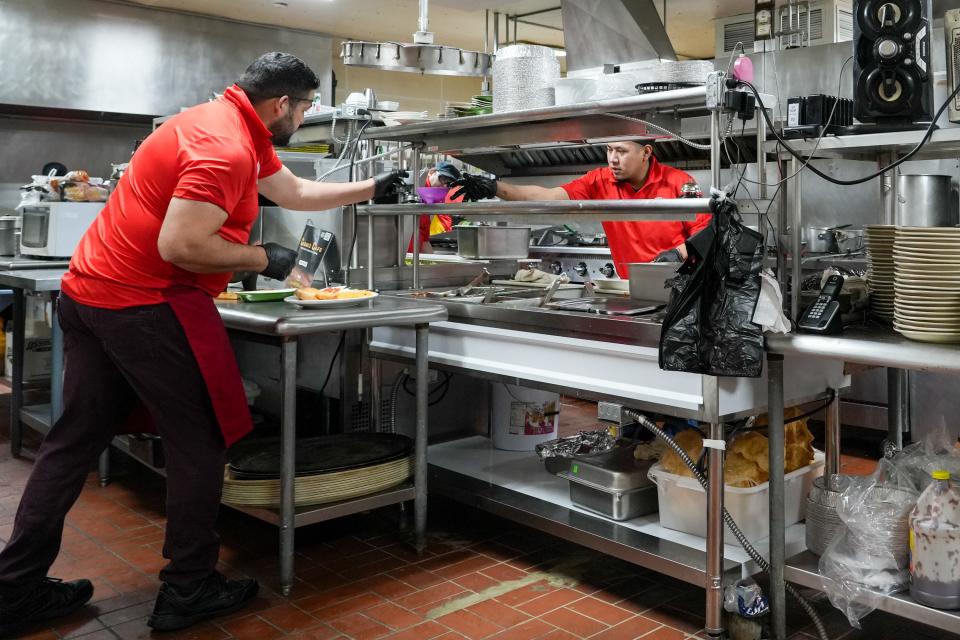
The influx caused tensions that led to the growth of two distinct communities: the traditional white population, marching forward as it always had, and the minority population, forced to create their own networks. But over the past two decades, locals seemed to realize that if Denison wanted to stay a regional trade center with a successful school district and thriving downtown, they couldn't swim against the current of diversity — and they might need a new playbook for helping recent residents feel ingrained in their community.
So, at the high school, band director Ruben Newell started a mariachi ensemble, emulating diverse districts in the Southwest. The elementary school founded a dual language immersion program, and the library invested in new books for its Spanish language section. The local Catholic priest even learned Spanish in the twilight of his career so members of his flock could celebrate Mass in a language they understood.
And, crucially, the community provided Spanish subtitles for one of its annual screenings of “It’s a Wonderful Life” — an invitation for Latinos to become part of the town's most closely held tradition.
More from Courtney Crowder: This Iowa meatpacking town didn’t always welcome immigrants. Then the high school started a mariachi band.
“They've actually taken steps to make sure that the whites and Latinos form one community, and we don't see that in other meatpacking towns,” Peters says. “In other meatpacking towns that we poll, things have simply gotten worse. There's been huge amounts of white flight, so there are people of color moving into those communities, but they're also rapidly diversifying because all the whites are leaving.”
“And they usually leave for the neighboring county or for the neighboring town.”
But Lopez says the blending goes beyond just economics and education. It’s less tangible, too. Today, people in Denison finally perceive themselves as one, she says.
Now, Cronk’s becomes part of that narrative. And a very important part, adds Peters, who notes that entertainment options have long served a social function underappreciated by academics.
These venues offer “a way for people to interact, get to know people on a personal level,” Peters says. “So if their job doesn't bring them into contact with people of color, or if they're retired and they are isolated with their old friends that they've known their entire lives, restaurants might be the only area where they would have contact with people that are different.”
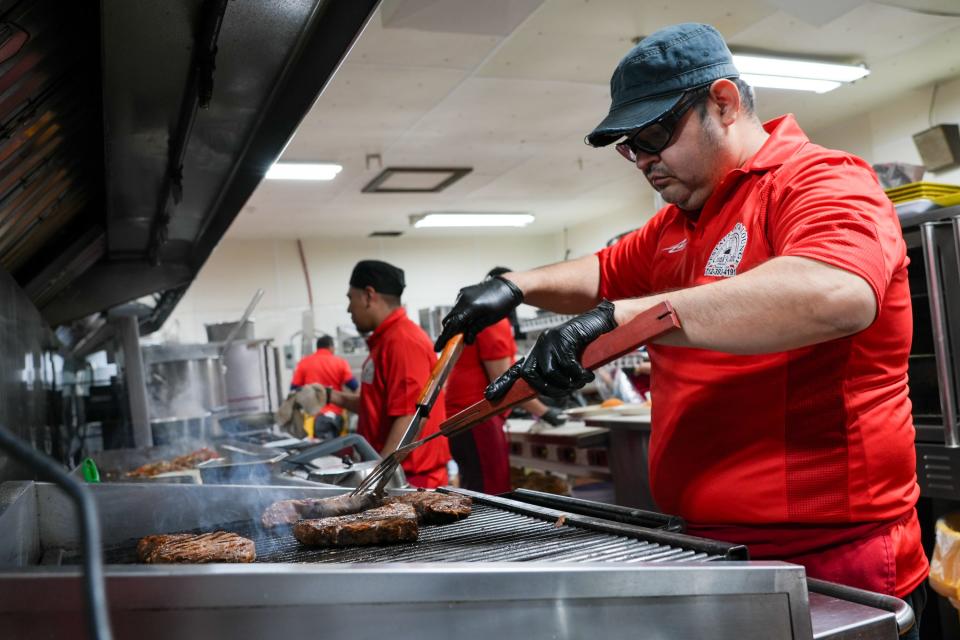
For Peters, Cronk’s is an encapsulation of the story of rural Iowa: out-migration of young people, and no one left to take over businesses except for new residents, often minorities. Its early success shows “a passing of the baton,” he says.
“All this points to the culture that Denison is moving forward and is able to handle whatever the challenges the next 10 years will throw at them,” he adds, including new waves of Sudanese and Pacific Islander communities recruited to the packing plants.
And as time passes, new traditions will become old hat, and fresh takes will be needed. The playbook will always need updating.
After all, no town — or restaurant, for that matter — is supposed to be a museum.
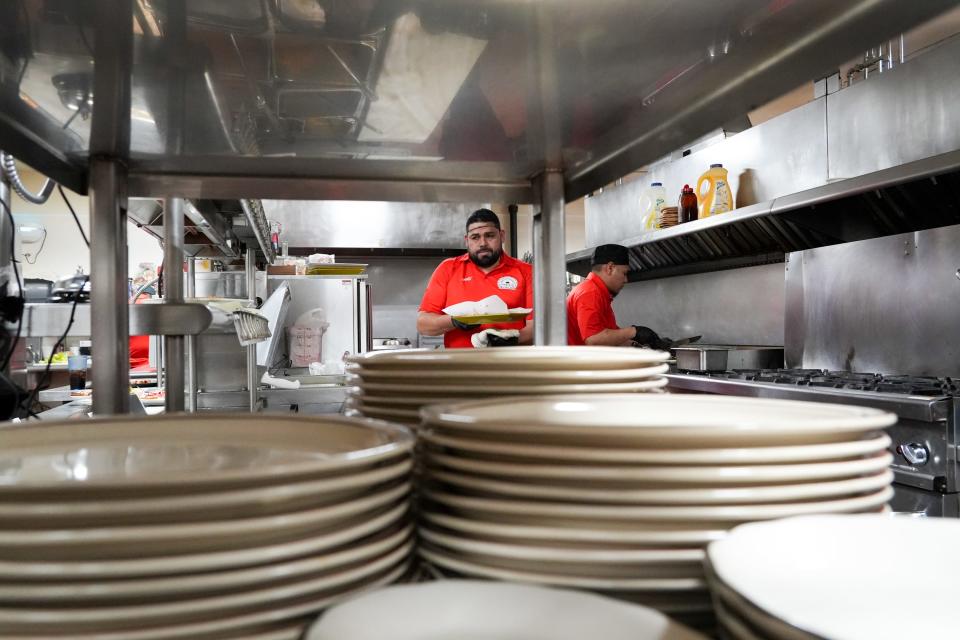
‘Mixing the beauty of both cultures’: The future of small towns — and their restaurants — is blended
You the owner?
An old man stops Omar Patino as he walks through the dining area to the small back room that doubles as his office.
Thanks for being open, the man says, before offering a suggestion. He and his wife spend part of their year in Arizona, he explains, and there they make quesadillas a little differently — two tortillas instead of one folded over. Just an idea, he offers.
Great flavors, though, the man says, adding that he’ll bring some friends next time. Patino nods.
“We’re still learning,” Patino says. “I know we could do a lot better.”
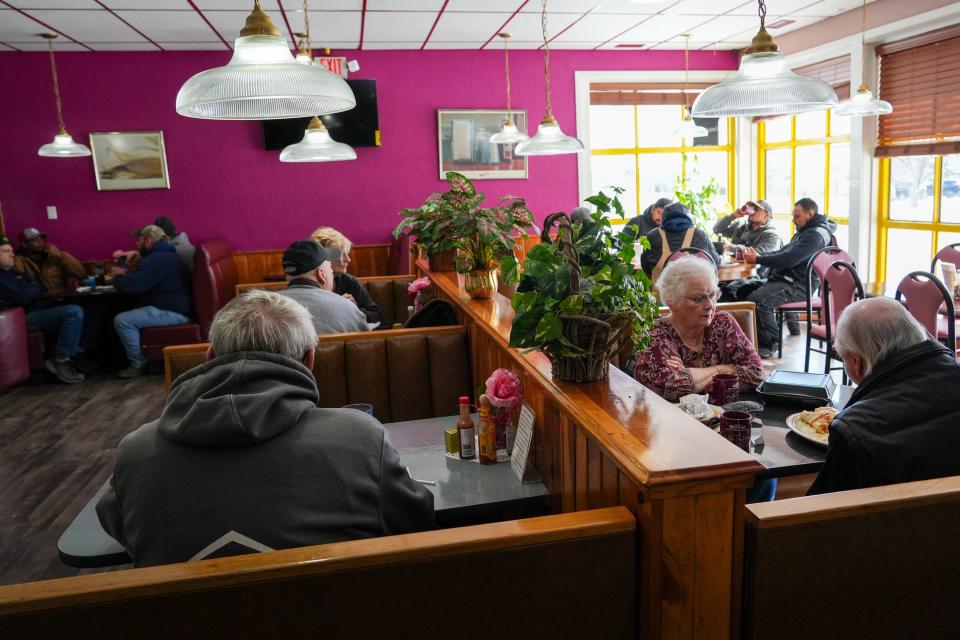
Patino gets that a lot, a mix of gratitude and suggestions. He watches people take selfies with the old Cronk’s signs that populate the lobby and knows they care deeply.
He listens to their stories; that they would come for special summertime pie and ice cream with their grandparents or to the buffet after church. He takes cues from what he hears — like adding a daily soup and bringing back the all-you-can-eat Sunday smorgasbord — and tries to impalpably exude some of the previous owners’ ways, too.
When some of the old-timers come in just for coffee, Patino spots them the dollar. Get us next time, he’ll say.
“We've had a few groups say that it was a big deal that we kept Round Table,” he says, pointing to the sunny corner. “A lot of people, they say it brings back memories for them to be able to sit there again.”
So he takes suggestions with grace: What they’re doing here is unique, like so much of what they have tried in Denison.
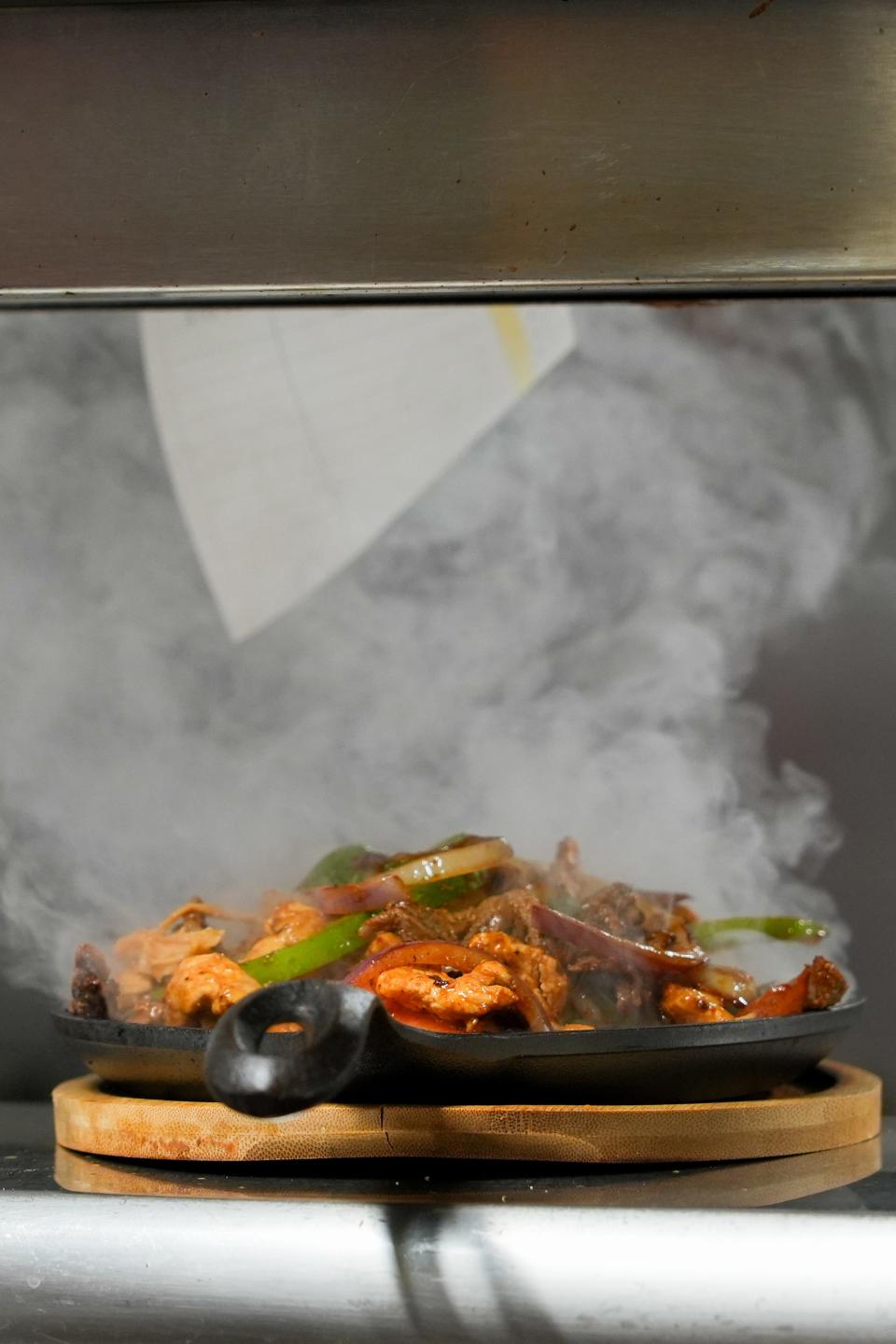
Patino represents the next generation, children of immigrants that have known only biculturalism. Both American and Hispanic. The newest of the new Denison.
“He was born in Denison and he went to school in Denison,” Lopez says, “and now his father, who is behind all this, is teaching his son to become an entrepreneur in this community.”
“Don't take this the wrong way, but how many people just leave and forget about this small community?” she adds. “This boy with his father, they can afford to send him out to a big city, but they chose to be here, based in this community, mixing the beauty of both cultures.”
Blending, Lopez says, is the future of small communities — if they want to grow, that is.
That combination mindset could be the future of rural restaurants, too, Dunker says, where the lifestyle of a family-run business dovetails with the values of traditional Hispanic culture, which prioritizes keeping kin close.
“Food entrepreneurialism in Iowa in the Hispanic community is a real movement,” she says. The association has seen the number of Latino restaurateurs grow so steadily that leaders are considering a committee that conducts business bilingually to offer further support.
“Rural Iowa restaurants, they need different models to survive and thrive,” Dunker says. “This blending of cuisine types, and my guess is blending of a traditional restaurant model with some Latino restaurant models, I think that this could be something that can be emulated in rural communities all over.”
“My guess is it will be very successful.”
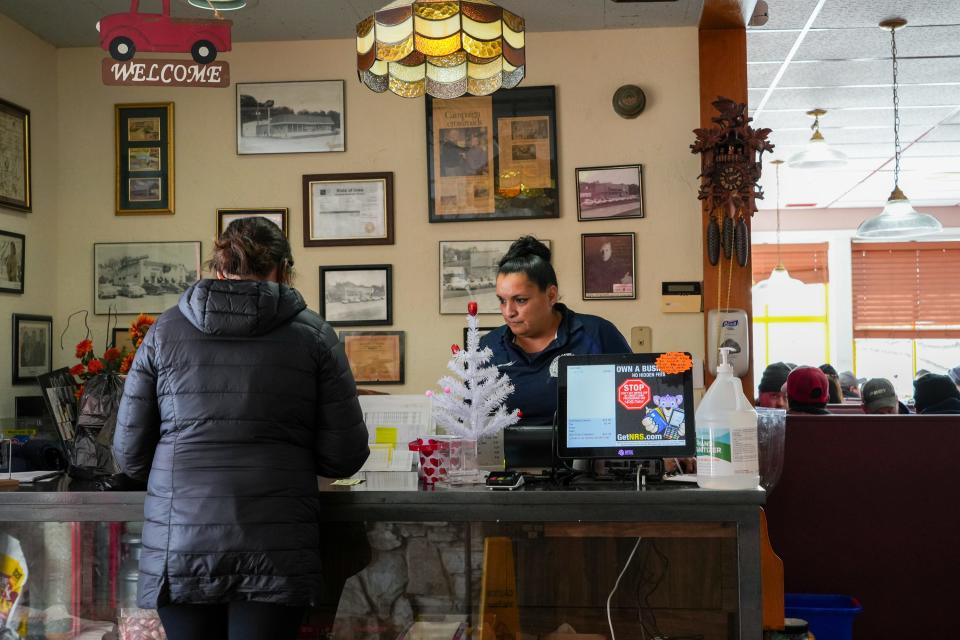
As he expedites plates or buses tables or calls in another order — not above getting in the thick of it when a rush comes in — Patino doesn’t think of Cronk’s as an American restaurant or a Mexican restaurant or a historical restaurant or a modern restaurant. He thinks of this as a family place, in ownership and customer base.
He thinks of it as more than a place you pass through, just like his dad always wanted. To him, it’s a place to gather in good times and in bad. A place to fill soul and stomach in equal measure.
It’s a place to enjoy each other’s company — no matter your background.
And his goal is simple: Keep Cronk’s open as long as possible.
So even though it’s easy to get mired in the day-to-day grind, Patino strives to focus on the long-term, on the heritage he’s building.
“It’s about keeping our last name around even when we're not, “ he says. “And hopefully, down the line, continuing to grow our last name, and have our last name mean something here in Denison.”
He gestures at the wall behind the front counter. He wants to add his own newspaper clippings and photos and knickknacks. Not replace the old, no, no. But add to it.
A new legacy. Written on the same walls.

Courtney Crowder, the Register's Iowa Columnist, traverses the state's 99 counties telling Iowans' stories. Reach her at ccrowder@dmreg.com or 515-284-8360.
This article originally appeared on Des Moines Register: How Mexican immigrants reopened Cronk’s Café in rural Denison, Iowa

